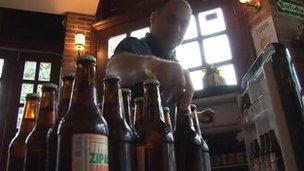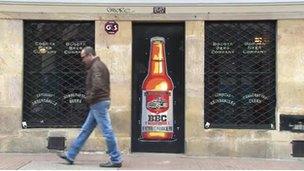My Business: Bogota's booming micro-brewery
- Published
Berny Silberwasser, 37, describes how a trip to the UK inspired him to set up a chain of British-style pubs in Bogota which serve only hand-crafted beers
Beer is big business in Colombia: a whopping $6.2bn (4.7bn euros; £3.8bn) a year business to be precise.
But for 37-year-old Berny Silberwasser the secret of his success has been keeping it small.
"The funny thing is that we actually are the second biggest brewery in Colombia," he says of the Bogota Beer Company which he founded in December 2002.
"But the biggest one (Bavaria, a subsidiary of the London-based multinational SABMiller) controls 99% of the market. They produce around 20 million hectolitres per year; we have a plant that produces 14,000 hectolitres."
The Bogota Beer Company, however, is not trying to compete with such a giant.
After all, the artisanal - or hand-crafted - quality of its products is one of the reasons why a dream that started with a $40,000 investment in second-hand brewing equipment grew into a business with an annual turnover of $12m.

Berny Silberwasser displays some of his company's 13 types of beer
"Our beers are not pasteurised. Some are filtered, but not all of them. We do use preservatives, but only natural ones. And as a result they have much more flavour," Mr Silberwasser told the BBC.
"If you go to our brewery you'll see we use lots of technology, but we produce our beer in small batches and we're very careful with the ingredients we use and how we use them."
The beers made by the Bogota Beer Company also offer an alternative to the typical blond beer that dominates the local market.
"In Colombia, for many years, we had only one big brewery with different brands that are basically the same lager," Mr Silberwasser explains.
He quickly realised there was a huge business opportunity.
'Cold weather helped'
The micro-brewery began producing three types of British-style ales, which it quickly began to sell in its own British-inspired pub in a busy neighbourhood of Bogota.
And, according to Mr Silberwasser, it was like a match made in heaven.
"The pub allowed us to interact more with customers, to teach them about different types of beer, to find out what was working and what wasn't working.
"And Bogota's weather contributed to our success. It's very rainy, very grey. And the cold, I think, is good for drinking beer, especially darker, stronger beers."
The Colombian capital's traffic - described by Mr Silberwasser as "terrible" - also helped.
"People started to go to the pub after work to wait for the traffic to get better," he says.
And almost a decade later "Bogota's biggest small brewery" has 13 different pubs scattered throughout the city.
It produces 13 different types of beer, from Munich-style "white beers" to British-inspired dark ones, such as porters and stouts.
And it has also started to bottle and sell its beers in bars, restaurants and supermarkets, and is making plans to distribute its products beyond Colombia's capital.
Difficult environment
It hasn't all been plain sailing though.
Colombia's long-standing internal conflict hit the newly born company in November 2003 when a hand grenade exploded in its first pub, killing one person and injuring 70.
"It was not an attack specifically against us," Mr Silberwasser says.
"I think the guerrillas wanted to send a message and they chose to do it like that and we simply got the shortest stick."
Mr Silberwasser remembers that clients stopped showing up for a few days.
"But we had the support of all our staff and we decided to open the day after the incident and I think people really appreciated that.

Mr Silberwasser is confident the Bogota Beer Company can handle the competition in the city
"It also gave us a lot of exposure. It's a bit sad, but after a while more people started to come. It was hard, but we made it through," he says.
Luckily for him, and for Colombia, in the following years the country's security situation improved dramatically.
Beer capital
The company also benefited from the increasing number of tourists that started to visit the capital, which filled itself with a large number of pubs and micro-breweries largely inspired by the success of the Bogota Beer Company.
Mr Silberwasser, however, says he is not afraid of the competition.
"We were the first ones, and that's always an advantage. But we don't rely on that. We work hard to stay the best, we don't think twice about investing in our locals, in the brewery, in training," he says.
"The only thing that really matters is that those small breweries also have a quality product, because people tend to group artisanal beers in the same category and if that's not the case they might start to associate artisanal with the rudimentary, and it shouldn't be like that.
"But otherwise, there still are a lot of opportunities for growth."
In any case, he has no doubts that, thanks to this boom, Bogota has a fair claim to the title of Latin America's beer capital.
"It certainly is the best city in Colombia for drinking beer," he says. "There are many places devoted to good beer and the variety of the offering is also increasing."
- Published15 February 2012
- Published8 February 2012
- Published1 February 2012
- Published17 January 2012
- Published24 January 2012
- Published7 December 2011
- Published21 December 2011
- Published14 December 2011